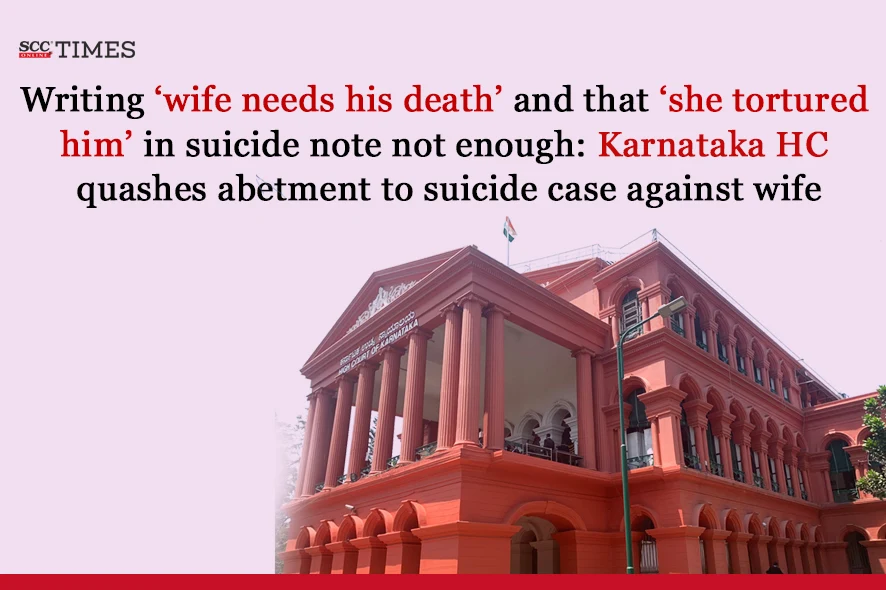Karnataka High Court: In a criminal petition filed by a wife seeking to quash a complaint and First Information Report (‘FIR’) in the case relating to abetment to suicide of her husband, a Single-Judge Bench of S. Vishwajith Shetty, J., quashed the FIR for abetment of suicide and held that the wife’s alleged torture and a statement in a suicide note that she ‘needs his death’ do not, in themselves, constitute a direct act of instigation necessary to establish the offence under Section 108 of the Bharatiya Nyaya Sanhita, 2023 (‘BNS’). The Court referring to various Supreme Court pronouncements noted that to convict a person for abetment to suicide, an active act or direct act which leads deceased to commit suicide finding no other option is required and the act must reflect intention of the accused to push deceased into such a position that he commits suicide.
Background
The accused and deceased’s marriage was solemnized on 8-12-2022 and lasted only about three months, after which the accused returned to her parents’ house. The deceased had filed a case for restitution of conjugal rights, and the accused had filed a case under the Protection of Women from Domestic Violence Act. The deceased had committed suicide by hanging himself in his house on 26-01-2025. In the alleged death note, which was left behind by the deceased, he has stated that his wife needs his death, and she had tortured him. An FIR was registered against the accused under Section 108 of the BNS. The accused filed the present petition under Section 528 of the Bharatiya Nagarik Suraksha Sanhita, 2023 (‘BNSS’) for quashing this FIR.
Analysis And Decision
The Court noted that there was no mention of any particular act committed by the accused which had nexus to the death of the deceased. For invoking Section 108 of BNS, the alleged act committed by the accused should have the proximity and nexus with the death of the deceased and the said act should also have abated, instigated or aided the deceased to commit suicide. The Court perusing the Complaint observed that necessary ingredients so as to attract the alleged offence was missing.
The Court noted that in Prakash v. State of Maharashtra, 2024 SCC OnLine SC 3835, the Supreme Court had observed that merely for the reason that accused had asked the deceased to go and die, that itself is not sufficient to constitute the necessary ingredients for the purpose of invoking the offence punishable under Section 306 of the IPC. The Supreme Court further observed that, “the word ‘instigate’ denotes incitement or urging to do some drastic or inadvisable action or to stimulate or incite. Presence of mens rea, therefore, is the necessary concomitant of instigation. It is common knowledge that the words uttered in a quarrel or on the spur of the moment cannot be taken to be uttered with mens rea”.
The Court further noted that in Mariano Anto Bruno v. State of T.N., (2023) 15 SCC 560, the Supreme Court observed that to convict a person under Section 306 IPC requires an active act or direct act which leads deceased to commit suicide finding no other option and the act must be such reflecting intention of the accused to push deceased into such a position that he commits suicide.
The Court further noted that in Ramesh Kumar v. State of Chhattisgarh, (2001) 9 SCC 618, the Supreme Court observed that instigation means to goad, urge forward, provoke, incite or encourage to do ‘an act’. Though it is not necessary that actual words must be used to that effect or what constitutes instigation must necessarily and specifically be suggestive of the consequence. Yet a reasonable certainty to incite the consequence must be capable of being spelt out.
In light of the afore-stated reasons the Court concluded that the FIR did not contain the necessary ingredients to attract the alleged offence. The Court held that this was a fit case to exercise its powers to quash the proceedings to secure the ends of justice.
[Feebi Gottam v. State of Karnataka, 2025 SCC OnLine Kar 17649, decided on 30-07-2025]
Advocates who appeared in this case :
For the Petitioner: Sachin C. Angadi, Advocate
For the Respondents: Girija S. Hiremath, HCGP For R1, Reshma Madiwalar, Advocate



This judgment underscores the necessity of direct, intentional acts in abetment to suicide cases. It highlights the importance of evidence beyond mere statements in suicide notes for criminal liability.